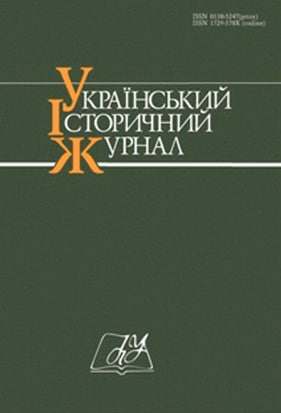Diaries by B. Lazarevskyi 1929—1933 and the Problem of His National Self-Identification
DOI:
https://doi.org/10.15407/uhj2025.01.182Keywords:
B. Lazarevskyi, Lazarevskyi’s family, diaries, national identity, Ukrainian diaspora in France, O. Koshyts, epistolary, “Tryzub” journalAbstract
The aim is to trace the changes in the national self-identification of the writer and cultural activist B. Lazarevskyi during his stay abroad, based on his diaries written in exile in France between 1929 and 1933. Selected diary entries highlight so-called Ukrainian markers in B. Lazarevskyi’s thoughts on Ukraine’s history; his evaluations of events in life and cultural activities of Ukrainians in exile; reflections on his relations with Ukrainian émigré circles, and the publication of works in the Ukrainian language, etc.
The research methodology is based on the principles of historicism, impartiality, multifactoriality, and comprehensive analysis aimed at objectively studying the relevant historical environment while considering the socio-political and cultural processes of the time. Source analysis employs critical, heuristic, and other methods.
The scientific novelty of this study lies in its analysis of previously unknown entries from B. Lazarevskyi’s diaries 1929—1933, which had not been explored by Ukrainian historiography. B. Lazarevskyi’s figure is presented in the context of his historical era. Biographical and creative parallels are drawn with historical figures who also shifted their national identity under the influence of political changes within the Russian Empire. The study offers an original perspective on the role and significance of Ukrainian markers in B. Lazarevskyi’s personal, public, and creative life during the 1920s and 1930s, as well as in the lives of other members of the Ukrainian diaspora in France. An analysis of B. Lazarevskyi’s diaries entries from 1929—1933 enriches historical scholarship with insights into the mentality, psychology, and behavioral characteristics of Ukrainian émigrés, providing further context for understanding the historical period and environment.
Conclusions. Since the Ukrainian Revolution of 1917—1921, B. Lazarevskyi’s political national consciousness had strengthened, manifesting more clearly during his French exile in the late 1920s and 1930s. Predominantly surrounded by Russian cultural circles, B. Lazarevskyi began to engage more actively with representatives of Ukrainian émigré communities, particularly those aligned with the Ukrainian People’s Republic. This shift influenced his views on Russo-Ukrainian relations during the historical period and after the defeat of Ukraine’s national liberation struggles. These changes were reflected in his diaries, which began to include entries in the Ukrainian language. His criticism of representatives of the Russian émigré community grew sharper. B. Lazarevskyi’s views during the 1930s reveal a process of metamorphosis in his national beliefs, leading him to support a republican vision of Ukrainian statehood. However, it is still challenging to conclude definitively that he fully embraced Ukrainian self-identification.


